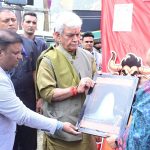Lieutenant Governor Manoj Sinha on Monday inaugurated power infrastructure projects worth Rs.192 crores.
The 25 projects inaugurated included 22 receiving stations costing Rs 50 cr; Smart Metering project costing Rs 62.88 cr & Smart Metering App – Smart Bill Sahuliyat, and Supervisory Control & Data Acquisition system at a cost of Rs 79.27 cr.
In presence of the Lt Governor, KPDCL and JPDCL signed MoUs worth Rs 1814 Cr & Rs 2174 Cr, respectively, with PESL (PGCIL), RECPDCL & NTPC for implementation of Revamped Distribution Sector Scheme (RDSS). It will strengthen distribution infrastructure and improve electricity supply to urban & rural areas.
Dedicating the power infrastructure projects to the people, the Lt Governor said the projects inaugurated today will add to the existing distribution capacity and provide quality power supply to the households and existing & upcoming industrial units in the respective areas.
The completion of projects under the MoUs signed today will go a long way to achieve the goal of providing 24×7 quality power to the people of Jammu Kashmir, he added.
We have made dedicated efforts to increase generation, transmission and distribution capacity and ensured that the people of J&K have access to hassle-free power supply, the Lt Governor observed.
Projects undertaken for creation of new receiving stations and augmentation of existing stations will ensure quality and reliable power supply to people. We have achieved huge capacity addition under Centrally Sponsored Schemes/PMDP projects. Out of 195 projects, 135 have been completed and the remaining 60 projects will be completed in coming months, the Lt Governor noted.
The power scenario in Jammu Kashmir, which was in shambles for decades, has witnessed a major turnaround with more electricity being supplied, especially in far-flung areas as compared to previous years, said the Lt Governor.
In Kashmir valley, additional capacities were created during the winter to enable peak demand and 10 percent more power was supplied as compared to last year. For the first time, in a single year out of total 30 grid stations, 11 stations have been augmented, he added.
Power supply position in Jammu region has improved after addition of new system capacities. These initiatives exemplify our commitment for inclusive development and to fulfil the needs of the common man, the Lt Governor further added.
The Lt Governor highlighted the reforms introduced in the last three years to improve the power infrastructure; enhance power sustainability & efficiency in the UT.
Under PMDP and Centrally Sponsored Schemes, a well-planned, systematic and comprehensive program is being implemented for improvement and upgradation of transmission & distribution infrastructure to streamline and strengthen the power supply across J&K, he said.
The target of 1727 MVA capacity addition has been achieved at 220 and 132 KV levels and 236 circuit km transmission line has been laid. We have added 2345 MVA capacity in the distribution sector and 8550 new distribution transformers have been installed in residential areas. Four mega hydro projects will be completed in coming years.
In the first phase of the smart metering project, 57,000 meters have been installed and 1.25 lakh smart meters will be installed during Phase II, he informed.
The Lt Governor directed the officials to avail the benefit of RDSS scheme.
Officers must evaluate the implementation of the Power Amnesty scheme, and make dedicated efforts to reduce AT&C losses. Remove apprehensions of people. Spread awareness regarding smart meters, he added.
The Lt Governor sought participation from the citizens in government’s efforts toward the socio-economic progress of rural and urban areas.
In order to make urban local bodies self-reliant, Housing & Urban Development Department has notified the introduction of property tax in Jammu & Kashmir like other parts of the country.
The Lt Governor said the administration will ensure common people don’t face any inconvenience. Every decision will be made in the interest of the people. Administration and responsible citizens must make others aware of the Property Tax and how we can contribute in transforming the cities as engines of growth, he added.








